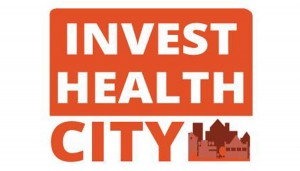Greensboro named one of 50 Invest Health
FOR IMMEDIATE RELEASE
Contact
Dr. Stephen J. Sills, Director of the UNCG Center for Housing and Community Studies, 336.944.6145, [email protected]
Greensboro named one of 50 Invest Health cities by Reinvestment Fund and Robert Wood Johnson Foundation
Greensboro to join innovative, national program to improve health in low-income neighborhoods
Greensboro, May 17, 2016 — Greensboro is one of 50 cities selected to take part in a new, national community health focused initiative. As part of the program, Greensboro will address the city’s pediatric asthma rate, which disproportionately affects low-income children.
Invest Health, a collaboration of the Reinvestment Fund and the Robert Wood Johnson Foundation, aims to transform how leaders from mid-size American cities work together to help low-income communities thrive, with specific attention to community features that drive health, such as access to safe and affordable housing.
A team representing the City of Greensboro, Cone Health, East Market Street Development Corporation, Greensboro Housing Coalition and The University of North Carolina at Greensboro (UNCG) applied for grant funding to improve the availability of safe, affordable housing for families living with asthma.
The team’s proposal was selected from 180 proposals representing 170 different cities across the nation. Over the next 18 months, Greensboro’s Invest Health team will receive a $60,000 grant, take part in a vibrant learning community and have access to highly skilled faculty advisors and coaches who will guide their efforts toward improved health.
“Greensboro’s asthma rate is influenced by higher than average poverty and uninsured rates,” explained Dr. Stephen Sills, director of the UNCG Center for Housing and Community Studies.
More than 19,000, or 29.3 percent, of children in Greensboro live in households below the poverty level, and a majority of those homes are not safe for children with asthma.
“These families have few options in terms of affordable and healthy housing, which consigns over 6,000 children with asthma to live in places that make them sick,” Sills said. “Strong evidence has linked plumbing or roof leaks, inadequate ventilation, faulty or inoperative exhaust systems, unclean floors and other surfaces, presence of rodents or cockroaches and building structure issues to subsequent asthma incidence and morbidity.”
Mid-size American cities face some of the nation’s deepest challenges with entrenched poverty, poor health and a lack of investment. But they also offer fertile ground for strategies that improve health and have the potential to boost local economies.
“Our goal is to transform how cities approach tough challenges, share lessons learned and spur creative collaboration,” said Amanda High, chief of strategic initiatives at Reinvestment Fund.
Greensboro’s Invest Health projects will explore a broad range of ideas, from leveraging relationships with the health system to connect affected patients’ families with community action planning, to aligning Invest Health efforts with existing housing improvement projects such as Housing Our Community.
The local team is represented by Cynthia Blue, City of Greensboro; Rev. Beth McKee-Huger, a community housing advocate; Kathy Colville and Jasmin Hainey, Cone Health; Dr. Patrick Wright, Cone Health Medical Group; Mac Sims, East Street Market Development; Brett Byerly and April Richard, Greensboro Housing Coalition; Dr. Tom Wall, Triad HealthCare Network, and Dr. Kenneth Gruber and Dr. Stephen Sills, UNCG.
Project teams will travel to Philadelphia for a kick-off meeting on June 7 and will meet regularly to share lessons learned throughout the 18-month project. A full list of awardees and more information is available at www.investhealth.org.
###
About Reinvestment Fund
Reinvestment Fund is a catalyst for change in low-income communities. We integrate data, policy and strategic investments to improve the quality of life in low-income neighborhoods. Using analytical and financial tools, we bring high-quality grocery stores, affordable housing, schools and health centers to the communities that need better access—creating anchors that attract investment over the long term and help families lead healthier, more productive lives. Learn more at reinvestment.com.
About the Robert Wood Johnson Foundation
For more than 40 years the Robert Wood Johnson Foundation has worked to improve health and health care. We are striving to build a national Culture of Health that will enable all to live longer, healthier lives now and for generations to come. For more information, visit www.rwjf.org. Follow the Foundation on Twitter at www.rwjf.org/twitter or on Facebook at www.rwjf.org/facebook.
